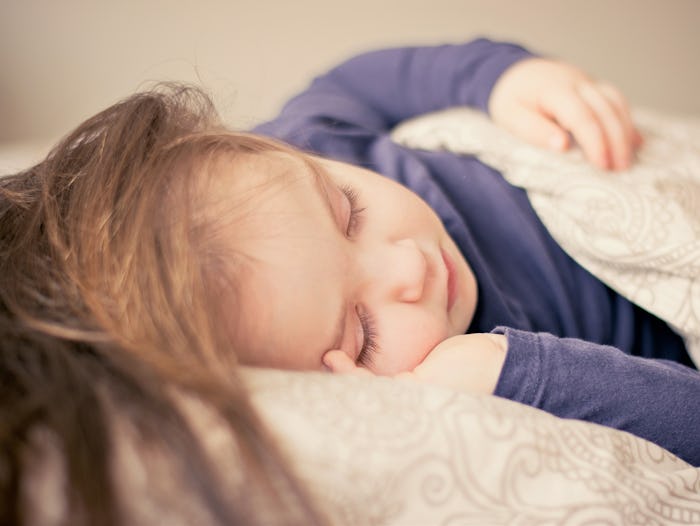As many parents know, getting your kid to go to bed (and stay there) is not always an easy task. While there are many reasons why kids might struggle with sleep, some causes are more serious than others. One is a condition called sleep apnea — and it's not only a risk while your child is asleep. A new study has found that untreated sleep apnea in kids can damage brain cells.
Obstructive sleep apnea is a condition where a person's airway becomes partially or completely blocked while they are asleep. When this happens, the body responds to the "choking" sensation by waking up, according to the American Academy of Otolarngology and Head and Neck Surgery. While people with sleep apnea sometimes don't remember being woken up, there are other symptoms that can give them a clue that sleep apnea is the culprit. Often, other people may hear them snoring loudly. In kids, parents may notice that their child is tired during the day, needs more naps, or is also experiencing bed-wetting, according to the AAO-HNS. Children with sleep apnea are sometimes found to have enlarged tonsils or adenoids, and there are other risk-factors for developing the condition as well, according to research from the Association of American Family Physicians.
A new study from the University of Chicago Medical Center has found that children between the ages of 7 and 11 who have sleep apnea also had less gray matter in the areas of their brains associated with mood, decision making, and self-control. The study looked at the brains of 16 children with sleep apnea using a magnetic resonance imaging machine (MRI), and observed them in a sleep lab overnight. They compared their findings with nine children in the same age group who didn't have sleep apnea, or any other sleep-related condition.
Researchers found that children with sleep apnea had greatly reduced amounts of gray matter in several regions of their brains. Many of these areas of the brain are directly responsible for things like memory, language, problem solving, and even personality. Other parts of the brain that were affected were areas like the temporal lobe, which can affect hearing.
That being said, even though researchers saw these areas of reduced gray matter, it's hard to tell if they could have a direct impact on any of the functions that part of the brain is responsible for. One reason for this confusion is that MRI scans can't look at the brain and tell if the brain cells have merely gotten smaller, — or if they're totally gone. That means, without additional research, it would be difficult to predict if and when the kids would show the effects of sleep apnea on their brains, and how the damage would manifest. Some of the researchers suggested that looking at the brains of older children and teens with sleep apnea could reveal additional clues about how long it takes for the damage to begin to show up — if it ever does.
Sleep apnea can be treated, however: some children may be candidates for a tonsillectomy, and others may be able to use something called continuous positive airway pressure therapy, (CPAP) which is a machine worn at night to help with breathing, according to KidsHealth. Some children also will outgrow sleep apnea, but if your child shows any signs of disrupted sleep or breathing trouble, definitely call your doctor to find out for sure what's causing it. Like many conditions that can negatively impact sleep, obstructive sleep apnea can be treated — but only if you know it's there.
